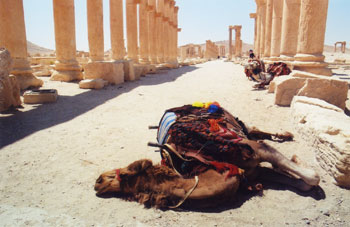Cairo to Istanbul Overland (Overview)
Crossing borders in the Middle East is a great first-time experience for a novice overlander. The borders are all safe, easy, and fairly quick, and as far as I could tell, there was no corruption. No bribing of officials, no visa fees varying widely from the reported amounts (with the exception of slight confusion in Lebanon), and generally kind, if not exactly friendly, officials. No special transport needed to get across the borders, not even any need to stop in border towns. At the most, you will see the drivers and/or assistants stocking up on duty-free cigarettes and liquor well beyond the legal limits, but that won't affect you.
 |
| Sunset on the Giza plateau |
Traveling exclusively by bus or service taxi allows you to experience the countryside that you would surely miss by flying to the major cities. And in cases like Turkey, traveling overland allows you to visit the south or east regions more easily when coming to or from Syria—if you had to fly in and out of Istanbul, you need more time to get all the way east and back again.
Riding a service taxi from Jordan is a nice family-bonding kind of experience, and only a few dollars more than taking a bus. You spend time in close quarters with locals, everyone helps each other understand the immigration procedures at the borders, you share food and water if you so choose, and you get through faster because there should only be four people in the car. This is definitely recommended.
Quick Tips
 |
| Camel at Palmyra |
1) The weather gets cooler, which is not an issue if you travel in winter, but since most people travel in summer, start in the hottest country and move north.
2) The food improves. It's depressing to start out with amazing manti in Turkey and end up with the pathetic falafels Egypt produces.
3) Because most other travelers use the classical route, you won't be on the gringo trail. I enjoy meeting other travelers, but I don't want to run into the same people all the time.
There is one major disadvantage to this route. If you go strictly overland, you cannot visit Israel. You will not be allowed into Syria or Lebanon with the Israeli stamp in your passport. It's possible to have a piece of paper stamped, but not guaranteed, and if Syrian/Lebanese officials even SUSPECT you have been to Israel, they can refuse you anyway.
If you have more time and money, you can still visit Israel; just loop back to Israel AFTER Syria/Lebanon, and then fly to Turkey.
Don't forget your international student ID—discounts galore!
Getting Around
Buses go everywhere, and they're cheap. Don't expect comfort. In both Jordan and Syria, minibuses are most prevalent, and are basically a van with no luggage storage. The bus I took from mainland Egypt to Dahab wasn't air-conditioned. In Jordan and Syria, buses wait until full before departing - you might wait for hours. Buses in Turkey are better, but the rides are quite long.
Trains in Egypt are excellent, and with a student ID, they're cheaper than buses. They mainly serve Nile destinations and Alexandria. In other countries, trains are impractical, unless you seek a romantic experience. Get train information here.
Taxis are everywhere. Watch for scams, especially in Lebanon. Usually you bargain with drivers, but in larger cities, except Cairo and Beirut, taxis should have meters. Some cities have night and day rates, so make sure the correct rate is used. Always know the real base rate before getting in. In Cairo, only bargain if you don't know the approximate fare. Consult your guidebook or locals for reasonable fares, then simply hand the money in through the window at your destination—try to have exact change. This technique can be used in other countries, but shouldn't be necessary.